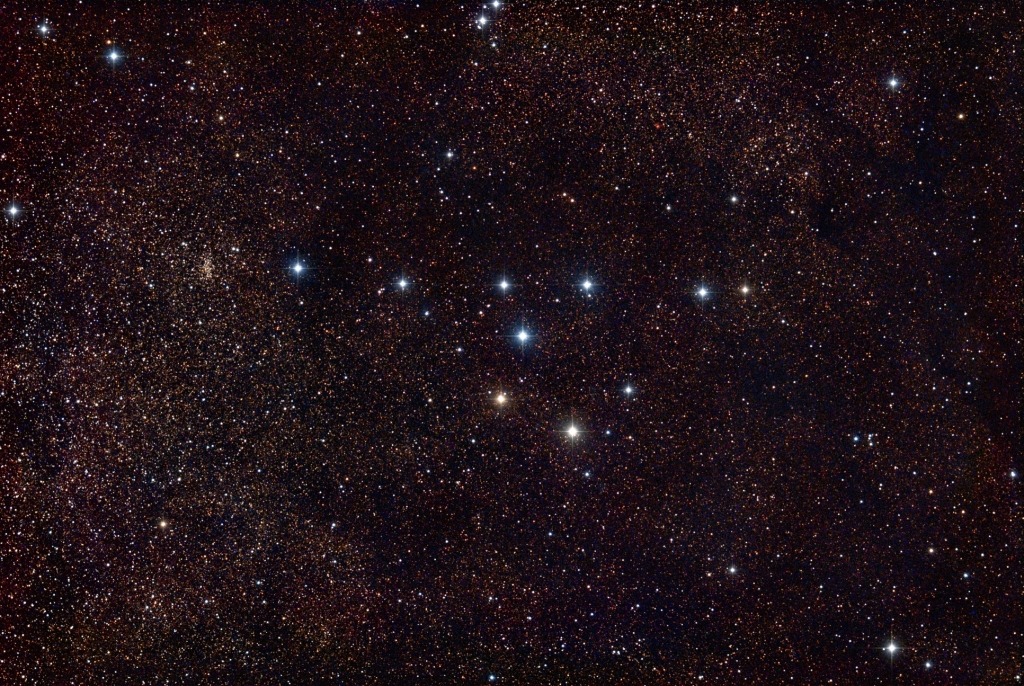Summer Gems
Among the northern summer constellations are some lovely star shapes.
They are Summer gems which lead us on a treasure hunt.
In this blog, I’ll provide maps to find that treasure.
Then all you need are your eyes and some binoculars.
Let’s go treasure hunting!
Summer Triangle
Our first map is a large scale star chart of the summer sky.
It shows the Summer Triangle made up of three bright stars.
They are Deneb and Vega at the top and Altair below.
The triangle is on show throughout summer in the southern sky.
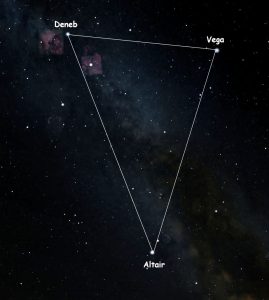
Summer Triangle. Credit: Stellarium
The Milky Way
The Milky Way runs through the Summer Triangle like a cloud.
Our galaxy is a flattened spiral.
The Milky Way we observe is the flat disc of our galaxy.
With those binoculars, the cloud becomes a field of stars.
Millions of stars lie inside the triangle.

Milky Way. Credit: NASA / ESA / HST
Just scan slowly along the Milky Way and you’ll see stars in clusters.
You might even glimpse the haze of nebulae, clouds of gas enveloping the stars.
You will also see dark patches, like holes in the Milky Way.
They are quite the opposite.
They are dark dust clouds that obscure the light of distant stars.
Sagitta
Our first little gem lies above Altair.
With binoculars. move slowly up from Altair.
Against the Milky Way background you will find the tiny constellation of Sagitta, the arrow.
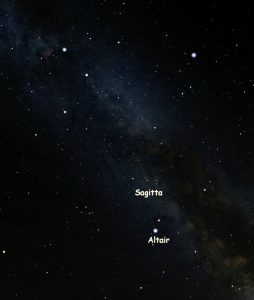
Altair & Sagitta. Stellarium
Sagitta looks more like a dart.
Two stars to the left make the shaft and two to the left form the flight.
If you have a telescope, you can find deep space objects to observe here.
Sagitta is one of Ptolemy’s original 48 constellations and one of the smallest.
It represents the arrow that Hercules used to kill Aquila the Eagle.
Aquila lies just below Sagitta, with Altair as its brightest star.
Coathanger Cluster
Once you have found Sagitta, you can move to our next Summer Gem.
With binoculars, look above the flight of the arrow.
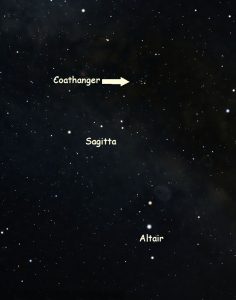
You’ll see a small straight line of stars with a hook of stars below.
You have found the lovely Coathanger Cluster.
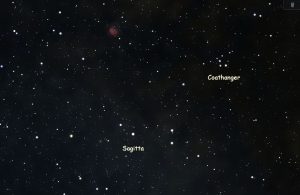
The Coathanger is also known as Brocchi’s Cluster or Collinder 399.
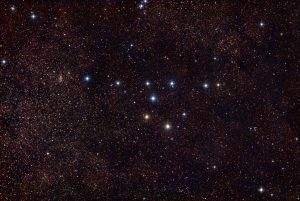
Coathanger Cluster. Credit: mini-WASP
The ten stars are not actually close to each other.
So they aren’t really a cluster at all but a pattern of stars, an asterism.
It’s still a great sight in binoculars or telescope.
The Celestial Dolphin
Our next piece of treasure can be seen easily with the naked eye.
It is Delphinus, the Dolphin.
This time look to the left of Altair.
You will see a diamond of stars with another star below.
This pattern represents a dolphin leaping from the sea.
There are a couple of legends associated with Delphinus.
In one Greek myth he helped the sea god Poseidon marry the nereid, Amphitrite.
In another story, Delphinus rescued the poet Aron of Lesbos from a watery grave.
A clever name
The diamond of Delphinus is also known as Job’s Coffin.
Its two brightest stars are called Sualocin and Rotanev.
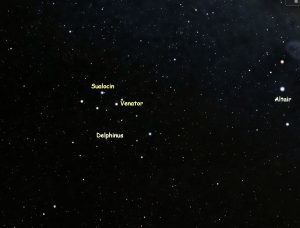
These are odd names until you know their story.
The names appeared in an Italian star catalogue from Palermo Observatory in 1814.
The director of the observatory was named Nicoli Cacciotore.
He had given the two stars their peculiar names.
But why?
An English astronomer, Thomas Webb, worked it out.
Translated to English, Nicoli Cacciotore would be Nicholas Hunter.
Translated again into Latin, the name becomes Nicolaus Venator.
So Nicoli Cacciotore becomes Nicolaus Venator.
Now look at those star names again.
Sualocin and Rotanev.
Spell them backwards!
Nicola Cacciotore had named them for himself in a wonderful piece of clever mischief!
The story has a happy ending.
In 2016, the International Astronomical Union adopted them as the official names.
Now I’m looking for a couple of unnamed stars.
I quite like Sinned and Nothsa.
Enjoy our summer gems!

The author: Dennis Ashton is a Fellow of the Royal Astronomical Society and a Wonderdome presenter.
Would you like to hear more Astronomy news?
Do you want to to find out about our upcoming public events?
Follow WonderDome Portable Planetarium on Twitter and Facebook or go to our web site wonderdome.co.uk


